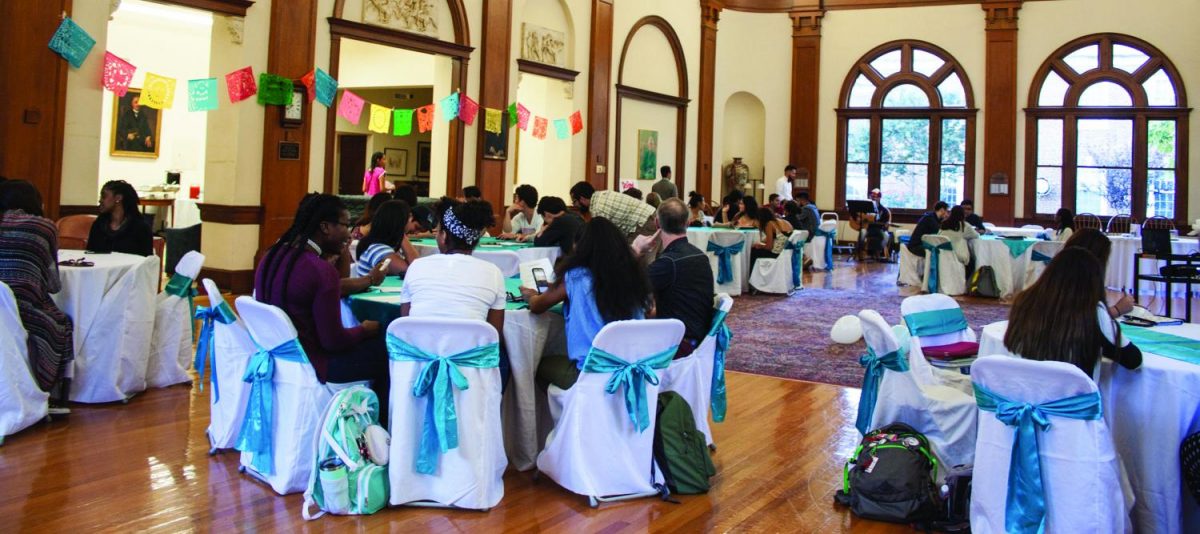HUG honors Latinx Heritage Month, talks DACA
“Right now, many communities of color are suffering, and the Latinx community is no exception,” said Irving Zavaleta Jimenez ’08 during his welcoming speech. “This banquet could not come any sooner. Tonight we have a space to breathe and be in community with each other.”
In celebration of Latinx Heritage Month, members of Hispanos Unidos de Guilford organized the Latinx Heritage Banquet which took place on Thursday, Sept. 26, 2017 in the Carnegie Room at Hege Library. The event featured entertainment by local musician Fredd Reyes, served traditional Latin American dishes and hosted local activist Laura Garduño García.
Reyes launched the event with an acoustic guitar performance and shared his hopes for the Latinx community to remain strong during difficult times.
“I’m here to bring joy to everybody. Music is amazing because it brings people together and helps you forget about all these insane decisions made in our government,” said Reyes. “I am here to share my music and enjoy good food with everybody.”
Senior Chris Dueñas, president of HUG, shared his enthusiasm for the event as he invited the community to help themselves to traditional Latin American food.
“Tonight we are holding our banquet, we are celebrating our culture and we are hoping to have a good time with everybody,” he said.
Volunteers from Latinx Impact, a service site that mentors Northeast Guilford High School students, spent approximately eight hours preparing traditional food from Mexico and Ecuador including rice, beans and deditos de queso, which are fried sticks of white cheese wrapped with dough. Beverages included strawberry juice and Agua de Jamaica, also known as hibiscus tea, and were served before the night’s keynote speech.
Laura Garduño García, local activist and DACA recipient from the Triad, served as the event’s keynote speaker. She recently accepted a job position with the American Friends Service Committee of the Carolinas.
“As I hear people’s stories and hear how resilient they’ve been, I just wondered where have these people been?” said García. “They’ve been living in the shadows.
“This is a room filled with powerful stories. Stories from our parents and ancestors, it is their blood that runs through our veins. It is through painful history that we find ourselves here.”
García expressed that in order to facilitate people’s pronunciation of her name, she would get rid of the Spanish pronunciation and introduce herself as simply “Laura Garduno” without the ñ.
“Weeks ago, I would introduce myself as Laura Garduno,” said García. “Today I feel proud of the resilience that my people and my family have shown and (I) am here today as Laura Garduño García.”
Following García’s remarks, HUG officials led a small dance party featuring Bachata, Merengue and Salsa music. The event ended on a celebratory note as attendees danced the last 30 minutes away.
First-year Ian Gordon left the banquet feeling inspired and more informed on immigrant issues.
“My favorite part of the event, aside from the food, was seeing people celebrating their heritage and who they are,” Gordon said. “And I thought it was beautiful for it shows a strong sense of community.
“The moment that stood out to me the most was when the keynote speaker spoke about how the Latinx community was here before DACA. And even though it was hard, they survived, and they will continue to survive again.”
García addressed approximately 65 attendees as she encouraged them to take action to protect DACA, but also to push for more comprehensive immigrant legislation. She ended her speech by highlighting the importance of having a more inclusive, permanent solution that can benefit immigrants of all ages.
“When you think of a DREAMer, you shouldn’t think of me,” said García. “You should think of my grandfather that continues to dream at 70 years old.”









